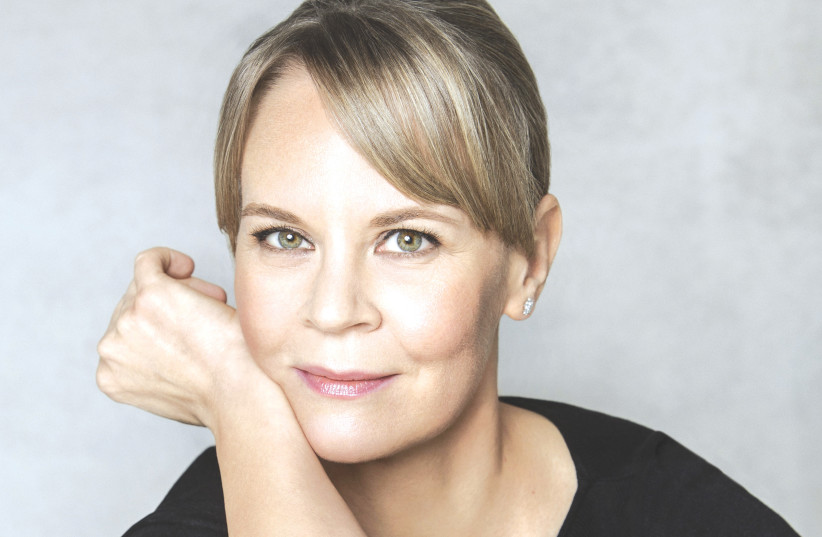Susanna Mälkki has been circling the globe for the past seven years in her dual roles as the Helsinki Philharmonic Orchestra’s chief conductor and the Los Angeles Philharmonic’s principal and first female guest conductor.
Along with her official roles, she has also appeared with other prominent orchestras in the US and Europe, (the Chicago Symphony, the New York Philharmonic, the Metropolitan Opera in NYC, the Berlin Philharmonic, the London Symphony and the Boston Symphony).
Next stop is Tel Aviv. On June 16 Mälkki will debut with the Israel Philharmonic Orchestra in the first of five concerts, with performances taking place at Tel Aviv’s Charles Bronfman Auditorium and the Jerusalem Theater as well as at the Rappaport Art and Culture Center Haifa Auditorium.
Malkki will share the stage with internationally acclaimed solo cellist Mischa Maisky. He was born in Russia in 1948 and she in Finland in 1969 where she received her musical training, first as a cellist and then as a conductor. She is known for her dynamism, professionalism, and imaginative programming, and will present IPO audiences with performances rich in imagination and beauty.
The concerts will include two symphonic tone poems: En Saga by Jean Sibelius and Le Poeme de l’extase by Alexander Scriabine, as well as Ernest Bloch’s Schelomo, Hebraic Rhapsody for cello.

Sibelius wrote En Saga for the Helsinki Philharmonic as a tone poem for local audiences without a specific story behind it. He expressed his desire to take each of his listeners on an adventurous musical journey during which they could make up their own stories, using the evocative character of the music to paint a personal landscape of Finland and the essence of its people.
Le Poème de l’extase is a tone poem that premiered in 1908 in New York City. Scriabine evokes an emotional landscape ranging from the softest and most personal feelings, expressed by solo instruments slowly emerging from the music and building into two ecstatic climaxes in a veritable panoply of passion.
Mälkki’s passion is music-sharing via live concerts. She believes in their power as a means of communication and considers their sum total to be greater than the combined efforts of the performers and the audience.
“I think between the two there is beautiful communication happening,” she says.
For Mälkki an unforgettable evening is created when the performers experience the attentiveness of the audience, the quality of the hall and the uplifting atmosphere they create together.
“The performers can always sense the attentiveness of the public, and it is really a joy to share. I think music is one more dimension of being together and creating beautiful memories.”
The only woman conductor
Mälkki is the only woman conductor to appear as a guest with the IPO this season, although it is her skill and not her gender that has earned her this role.
As a guest conductor at La Scala opera company in 2011 she became the first woman to conduct a production in its history. She is also the recipient of many additional first-place awards and much critical acclaim.
A strong proponent of contemporary music, Mälkki considers it a privilege to work with living composers such as British composer, pianist and conductor Thomas Ades. She rejoices in being able to develop relationships with them over the years.
“I am pleased to be the messenger of their music to the world,” she says respectfully.
An accomplished cellist in her own right, Mälkki will share the IPO stage with internationally acclaimed cello soloist Mischa Maisky in the performance of Ernest Bloch’s monumental work, Schelomo, Hebrew Rhapsody.
Maisky was born in Russia, also in 1948, and made aliyah to Israel in 1972. In the intervening years, he not only had the distinction of studying cello with the renowned Mstislav Rostropovich at the Moscow Conservatory from 1966 until 1970, but was also arrested in connection with his sister’s aliya.
He spent 18 months in jail and in a labor camp, followed by two further months of punishment in a mental hospital.
In 1972 Maisky was permitted to make made aliya. Once an Israeli citizen he was chosen to study with the great cellist and teacher Gregor Piatigorsky in Los Angeles, where he debuted at Carnegie Hall. The rest is history.
Today Maisky is noted as one of the finest cellists in the world and frequently performs with his three eldest children, each of whom is a fine musician.
He proudly claims he plays cello from the heart and never plays anything he does not love. That is one reason he now plays contemporary music such as the cello concerto written by Russian/Israeli composer Benjamin Yusupov.
“It is music which speaks to one’s heart.”
